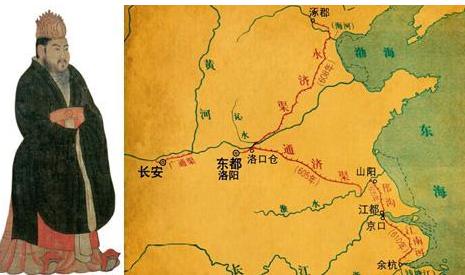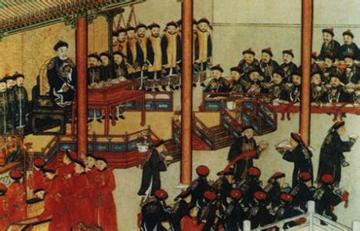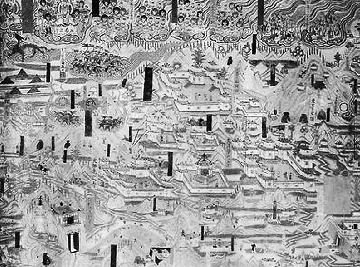New Reforms of the Sui and Tang Dynasties
5 min readThe prosperity of the early Tang came from contemporary economic and social development. The reclamation of land and irrigation marked with bending shaft ploughs and scoop waterwheels gave higher freedom to individual peasants, leading to the rapid development of intensively cultivated small land blocks and produced a great number of middle and small landlords. Meanwhile the decadent gentry or landlords crushed by the widespread peasant wars at the end of the Sui Dynasty, gradually declined. The individual cultivation-based landlord broke the fetters ofthose gentry families and started to get full play in state politics, initiating a range of far-reaching innovations in the prevailing systems.

Establishment of the Three-Ministry and Six-Department System in the Sui and Tang dynasties was a significant change in the ancient Chinese official system. Zhongshu Ministry, Menxia Ministry and Shangshu Ministry were the supreme administrative organizations of the country, in charge of decision-making and drafting orders, and the review and execution of state affairs respectively. UnderShangshu Ministry, six departments were set up. The Organization Department was in charge of the appointment and assessment of officials. The Hu Department was incharge of land resources, household registry, taxation, and financial affairs. The Li Department was in charge of ritual affairs, celebrations, sacrifices, schools and imperial examinations. The Bing Department was in charge of officer selection, serviceman registry, military orders and weapons. The Xing Department was in charge of laws, orders, the judiciary, criminal punishment and prisons. The Gong Department was in charge of civil engineering, irrigation and flood control, arable land, traffic, etc. The heads of these three ministries were prime minister. They discussed state affairs and assisted the emperor in ruling the country, sharing thepower of prime minister while supplementing each other and checking each other. The works of the six departments were well divided, peeled off the functions of managing affairs of the imperial family of Nine Qing before and became the formal administrative institutes of the country.

The expostulation system was designed to supervise and correct major policies of the court. Even the orders of the emperors were intensified in the Tang Dynasty, and Menxia Ministry had the exclusive right to review and return the orders of the emperor and reject reports of the officials. During the Zhenguan Period, the “WuhuaPanshi”system was also implemented, allowing officials of concerned departments tooverview all the major military events and present their views to the emperor for the final decision. To ensure administrative efficiency, officials who intentionally delayed the deadline of the joint signature would be punished.
The Wei, Jin and Southern and Northern dynasties highlighted family background when selecting officials. Descendants of noble birth could get promoted to ministers and monopolize the positions for generations even though they sometimes were ignorant, incompetent and unenterprising. But things had changed in the Sui and Tang dynasties with the increasingly bigger role of emerging commoner-landlord class, hence the establishment of the official selection system with imperial examinations. Under the system, the central government chose officials with regular imperial examinations and emphasized that capabilities were the standard for official selection. The imperial examinations were divided into Jinshi and Mingjing. Ming. jing was designed to test the capability of reciting classics. Jinshi mainly focused on poetry and ode writing and strategies on current affairs, aimed at testing the person’s capability of governing political affairs and solving social problems. The scholars had to pass further examinations of the organization department and the outstanding ones would be chosen and appointed.Another way to be appointed was to first act as assistant in the local government and then be recommended by senior officials.

The official selection system with imperial examinations broke the monopoly of the rich and powerful families,expanded the social foundation for the central regime and injected a fresh force into social development.It created a relativelyobjective,equitable and fair official selection mechanism,ensuring the continuous introduction of talented people and providing the state organization with a systematic guarantee for vigorous,stable and efficient performance.
Tang’s laws simplified the system of the Sui and had lighter penalties. Execution was very prudently applied,and five-time review was required before any execution.Comment on Law of Tang Dynasty is the earliest extant code in China,having great influences on Asian countries throughout history .
The Early Tang Dynasty made certain adjustments based on the System of Equal Distribution of Land adopted since the Northern Wei and Sui dynasties.Provisions onawarding land according to numbers of slaves and maids,buqu(a social class between slaves and ordinary people)and cattle were canceled,keeping the despotic economy in check to some extent.Officials with five-rank or higher and those honored due to feats of arms were also awarded a certain size parcel of land based on respective ranks and levels of merits,which served as an important way to support the emergin landlord class.Restrictions on sales of some types of land,like permanently-held land and bestowed land,were loosened,facilitating the development of private ownership of land.With regard to tax and corvee system,Tax-Labor-SubstitutionSystem was implemented widely,which allowed replacement of corve with silk or cloth.In the middle Tang Dynasty,the merging of land and false reporting of household population led to the collapse of the System of Equal Distribution of Land.The court also changed the Tax-Labor-Substitution System to the Dual-Tax System,speeding up the process of land privatization and the development of the commoner-landlord economy. The Dual-Tax Law stipulated that taxes would be levied based on the size of property and land of each household-and not based on population-which released the control over peasants. In addition, coins largely replaced physical goods in tax paying, and nobles, bureaucrats and merchants were all required to pay tax, too. That expanded the government’s tax sources and increased its revenue. Those principles were mostly inherited by later generations.
These significant systematic reforms implemented in the Sui and Tang dynasties reflected the development of the emerging commoner-landlord system and their political pursuits as well. They initiated a new trend for future social development and made the Sui and Tang dynasties a critical turning point in ancient Chinese history.








